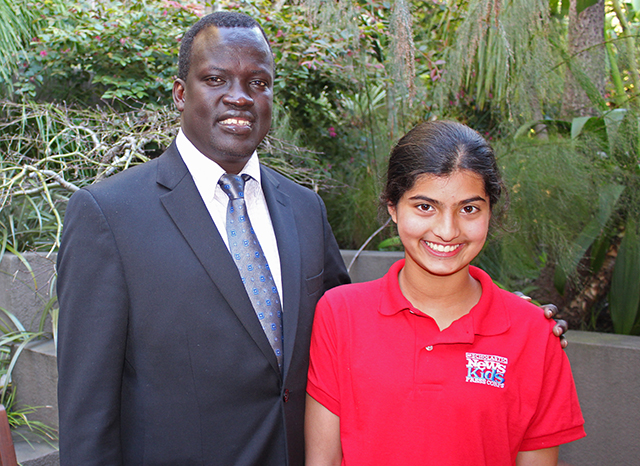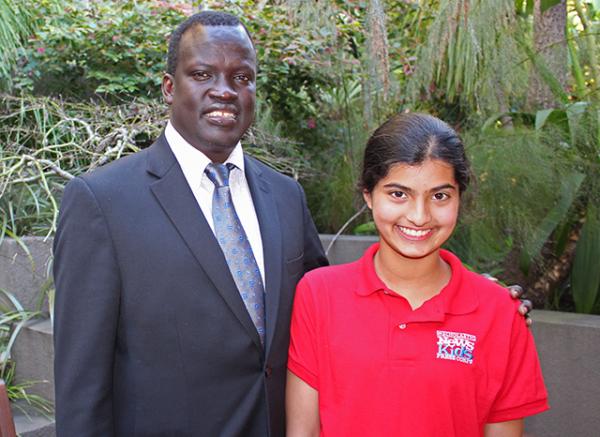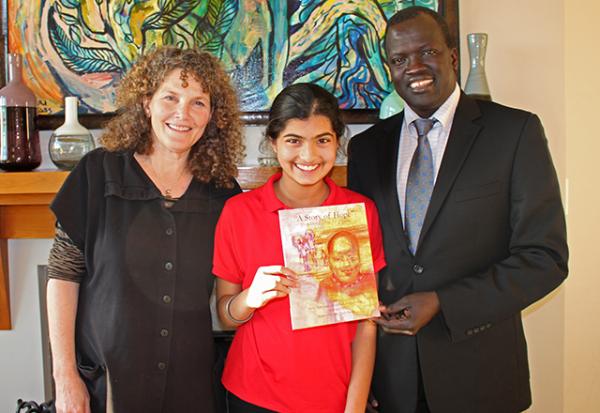KID REPORTERS’ NOTEBOOK
A Refugee’s Story


Deng Jongkuch with Manat in Oakland, California
South Sudan, a country in northeastern Africa, won its independence from Sudan in 2011. The independence came after a decades-long civil war that claimed the lives of an estimated 2 million people and displaced millions of others.
In 1987, Sudanese soldiers attacked villages in what was then southern Sudan. More than 20,000 young boys fled. They became known as “the Lost Boys of Sudan.”
This is the story of one of them, Deng Jongkuch, whom I met on his recent visit to schools in the San Francisco area.
FLEEING VIOLENCE
Born in Bor County in Southern Sudan, Jongkuch had a normal life until the age of five. “We often played in the river,” he recalled. “Food was never scarce.”
One night, his neighborhood was attacked. Fearing for his life, 5-year-old Deng ran and ended up being separated from his family. He spent four years in a refugee camp in neighboring Ethiopia with thousands of other boys.
In 1992, after the government of Ethiopia forced out the Lost Boys, they embarked on a 1,000-mile, yearlong journey to Kenya. They had little food or water. Nearly half of the boys died of hunger or disappeared.
“It was clear that if you didn’t keep walking, you would die,” Jongkuch said.
Jongkuch then spent nine years in a United Nations refugee camp in Kenya. He was fortunate to be among the 3,800 refugees accepted into the United States.

Lisa Wade and Jongkuch share A Story of Hope with Manat
GIVING BACK
In 2001, Jongkuch arrived in San Jose, California. He experienced many firsts, including electricity, television, and running water. “My first thought when I turned on the tap was, 'Who is boiling the water?’” he said.
Jongkuch worked two jobs and graduated from San Jose State University. In 2005, after an 18-year odyssey, he returned to South Sudan and was reunited with his parents. Stunned by the lack of roads, doctors, running water, and schools, he wanted to help.
Jongkuch met Lisa Wade, a Berkeley resident, who was touched by the story of the Lost Boys. The two shared Johngkuch’s story at local schools and collected $20,000. “The biggest donation we ever received was $25,” Wade said. They built Malek Primary School in Bor with villagers’ help.
In 2011, Jongkuch and Wade wrote A Story of Hope: The Journey of a Lost Boy of Sudan. The book describes how Jongkuch overcame hardship with hope and courage. The proceeds from the book go to ImpactAVillage, their nonprofit, to build schools in rural villages globally.
Seven years ago, Jongkuch happily became a U.S. citizen. “When you’re in a refugee camp, you want to get out, get food, and get an education,” he said. He is proud that he is now able to give back to people in need.
